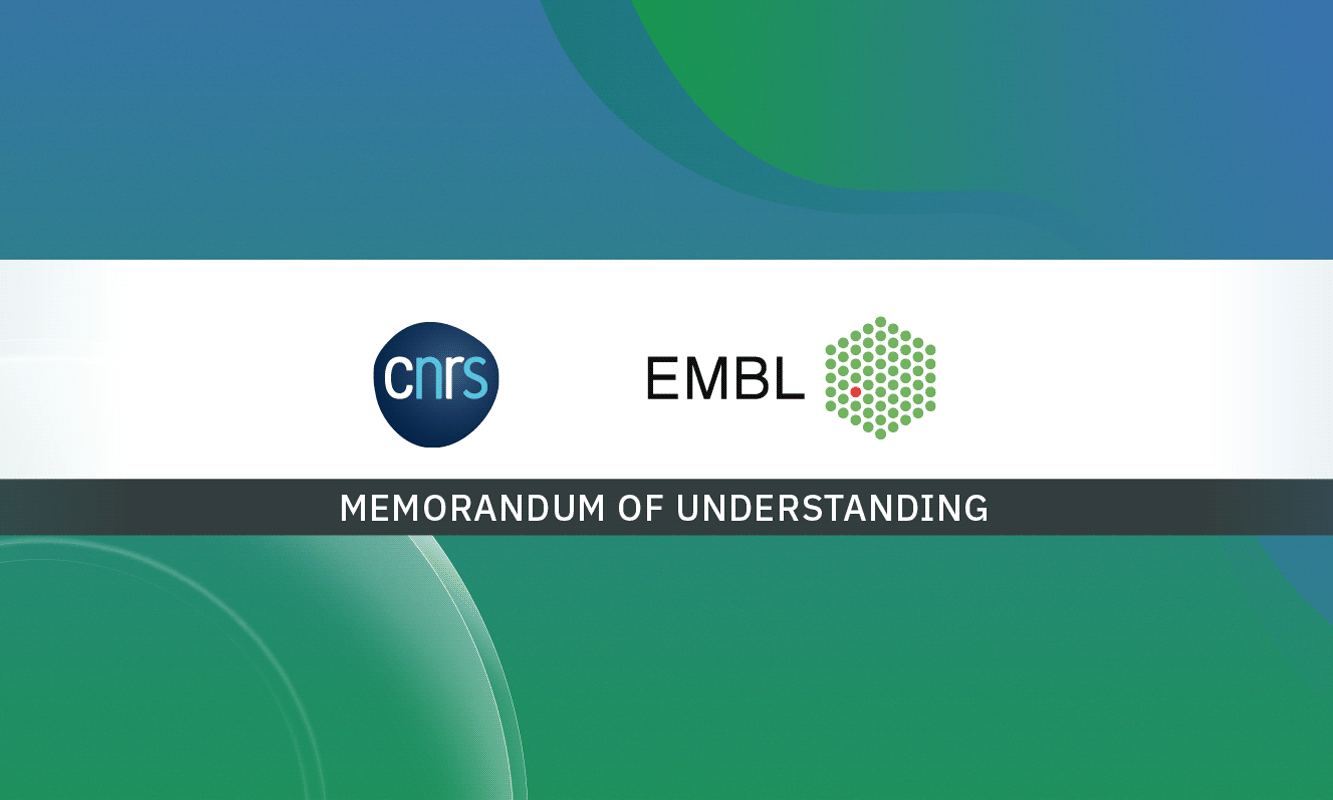
Strengthening collaborations in France
EMBL and the French National Centre for Scientific Research (CNRS) signed a memorandum of understanding

Planetary biology, marine biology, microbial ecosystems, human ecosystems, ecology, and environmental sciences — these cross-disciplinary topics are the focus of the memorandum of understanding (MoU) recently signed by EMBL and the French National Centre for Scientific Research (CNRS).
With environmental challenges becoming more relevant to human health and ecosystems, multidisciplinary research with relevance to the focus areas of the MoU will be at the heart of the collaboration between EMBL and the CNRS. The French interdisciplinary public research organisation is among the world’s leading scientific institutions.
Scientists at EMBL and at the CNRS laboratories have already established a number of connections and collaborations in the past few decades. The MoU aims to strengthen these links.
“This collaboration between EMBL and the CNRS will facilitate bringing together the right people to research human and planetary health,” said EMBL Director General Edith Heard. “The future scientific plans of the CNRS and EMBL are well aligned, so we hope to drive forward European life sciences together.”
EMBL’s French site in Grenoble already cooperates with the Institut de Biologie Structurale (a laboratory jointly operated by the French Alternative Energies and Atomic Energy Commission CEA, the CNRS, and the Université Grenoble Alpes, UGA) through the Partnership for Structural Biology. The partnership was created together with the European Synchrotron Radiation Facility and the Institut Laue-Langevin on the European Photon and Neutron science campus.
In addition, EMBL Grenoble has been building scientific collaborations with the Grenoble-based Institute of Advanced Biosciences (IAB, a laboratory jointly operated by the CNRS, Inserm, and UGA) for more than 15 years. This strong connection was also recently reinforced with an MoU between IAB and EMBL to expand collaboration across EMBL sites.
Furthermore, connections with two more institutes of the CNRS — the Institute of Biological Sciences (INSB) and the Institute of Ecology and Environment (INEE) — have been established through the collaboration with Tara Oceans, which was initiated by former EMBL Group Leader and the CNRS Director of Research Eric Karsenti.
This new MoU between EMBL and the CNRS is therefore part of a natural process to establish a cross-organisation collaboration in research, scientific services, and training.
“This agreement establishes prospects for collaboration that break with previous programmes and targets new scales of investigation to better address the complexity of biological interactions in a changing environment,” said Antoine Petit, Chairman and Chief Executive Officer of the CNRS.
Renforcement des collaborations en France
L’EMBL et le CNRS ont signé un protocole d’entente
Biologie planétaire et marine, écosystèmes microbiens et humains, écologie et sciences de l’environnement — ces thèmes transversaux sont au cœur du protocole d’entente qui a été signé récemment par l’EMBL et le Centre national de la recherche scientifique (CNRS).
Les défis environnementaux devenant de plus en plus importants pour la santé humaine et celle des écosystèmes, la recherche multidisciplinaire en rapport avec les domaines d’intérêt du protocole d’entente sera au cœur de la collaboration entre l’EMBL et le CNRS. L’organisme public de recherche interdisciplinaire français figure parmi les principales institutions scientifiques du monde.
Les scientifiques de l’EMBL ont déjà établi un certain nombre de connexions et de collaborations avec des laboratoires du CNRS au cours des dernières décennies. Ce protocole d’entente vise à renforcer ces liens.
“Cette collaboration entre l’EMBL et le CNRS va faciliter la mise en relation des personnes clés dont les recherches portent sur la santé humaine et planétaire”, a déclaré Edith Heard, directrice générale de l’EMBL. “Les projets scientifiques du CNRS et de l’EMBL pour le futur sont bien alignés; nous espérons donc faire avancer ensemble les sciences de la vie au niveau européen.”
Le site français de l’EMBL à Grenoble coopère déjà avec l’Institut de biologie structurale (un laboratoire géré conjointement par le CEA, le CNRS et l’Université Grenoble Alpes, UGA) par le biais du Partenariat pour la biologie structurale. Ce partenariat a été créé avec l’European Synchrotron Radiation Facility et l’Institut Laue-Langevin sur le campus EPN (European Photon and Neutron).
En outre, l’EMBL Grenoble a établi depuis plus de 15 ans des collaborations scientifiques avec l’Institut pour l’avancée des biosciences (IAB) de Grenoble, un laboratoire géré par le CNRS, l’Inserm et l’UGA. Cette forte connexion a été récemment renforcée par un protocole d’entente entre l’IAB et l’EMBL afin d’étendre cette collaboration aux autres sites de l’EMBL.
A un autre niveau, des liens avec deux instituts thématiques du CNRS, l’Institut des sciences biologiques (INSB) et l’Institut de l’écologie et de l’environnement (INEE), ont été établis par l’intermédiaire de la collaboration avec Tara Océans, projet initié par Eric Karsenti, ancien chef de groupe à l’EMBL et directeur de recherche au CNRS.
Ce nouveau protocole d’entente entre l’EMBL et le CNRS s’inscrit donc dans un processus naturel visant à établir une collaboration en matière de recherche, de services scientifiques et de formation à l’échelle des deux organisations.
“Cet accord établit des perspectives de collaboration en rupture par rapport aux programmes précédents et cible de nouvelles échelles d’investigation pour mieux aborder la complexité des interactions biologiques dans un environnement changeant”, a indiqué Antoine Petit, président-directeur général du CNRS.


